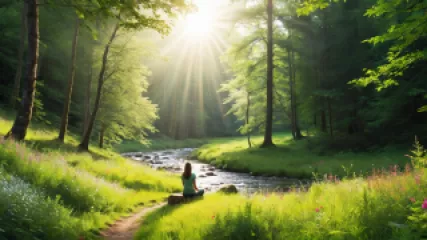Nature Connection: An Interview with a Mental Health Advocate
Nature Connection: An Interview with a Mental Health Advocate
In today's fast-paced, technology-driven world, the importance of connecting with nature has never been more crucial for our mental health and well-being. To explore this topic further, we sat down with Kate Roberts, a renowned mental health advocate and nature enthusiast, to discuss the transformative power of the great outdoors.
The Healing Power of Nature
Kate's passion for nature-based healing began at a young age when she spent endless hours exploring the forests and meadows near her childhood home. "There was something so calming and grounding about being surrounded by the natural world," she reflects. "The sights, sounds, and smells of nature had a profound effect on my mental state, helping me to find a sense of peace and clarity that I couldn't achieve in other environments."
As Kate grew older and began her career in the mental health field, she continued to witness the profound impact that nature had on her clients. "I would often recommend that my clients spend time outdoors, whether it was going for a hike, sitting by a stream, or simply taking a walk in the park," she explains. "The results were remarkable. Clients reported feeling less anxious, more focused, and generally happier after engaging with nature."
The Science Behind Nature-Based Therapy
Kate's observations are backed by a growing body of scientific research that has explored the mental health benefits of nature exposure. Studies have shown that spending time in natural environments can reduce stress levels, improve mood, and even boost cognitive function.
One of the key mechanisms behind these benefits is the calming effect that nature has on the autonomic nervous system. "When we're in nature, our bodies naturally shift into a more relaxed state," Kate explains. "The parasympathetic nervous system, which is responsible for 'rest and digest' functions, becomes more active, while the sympathetic nervous system, which controls the 'fight-or-flight' response, takes a backseat."
This physiological shift can have a profound impact on mental health. "By reducing stress and anxiety, nature exposure can help to alleviate the symptoms of conditions like depression, PTSD, and even chronic pain," Kate says. "It's a truly holistic approach to mental health that addresses both the mind and the body."
Incorporating Nature-Based Therapy into Practice
Given the powerful mental health benefits of nature, Kate has made it a central focus of her practice as a mental health advocate. "I work with my clients to develop personalized nature-based therapy plans that incorporate everything from guided meditations in the woods to adventure-based activities like rock climbing or kayaking," she explains.
One of the key aspects of Kate's approach is the emphasis on mindfulness and sensory awareness. "When we're in nature, it's so easy to get caught up in our thoughts and worries," she says. "But by encouraging my clients to slow down, tune into their senses, and really immerse themselves in the natural environment, we can help them to achieve a deeper level of presence and connection."
This focus on mindfulness and sensory awareness is not only beneficial for mental health but also helps to foster a deeper appreciation and respect for the natural world. "I believe that when we develop a stronger connection to nature, we're also more likely to take steps to protect and preserve it," Kate says. "It's a win-win situation for both our individual well-being and the health of the planet."
The Challenges of Nature-Based Therapy
Despite the numerous benefits of nature-based therapy, Kate acknowledges that there are also some challenges that need to be addressed. "One of the biggest hurdles is accessibility," she explains. "Not everyone has easy access to natural environments, especially those living in urban areas or low-income communities."
To overcome this challenge, Kate has worked to develop creative solutions, such as incorporating virtual reality technology into her therapy sessions. "While it's not the same as being in the real outdoors, VR can still provide a powerful sense of immersion and connection with nature," she says.
Another challenge is the need for specialized training and support. "Nature-based therapy requires a unique skill set, from outdoor safety and survival skills to knowledge of local ecosystems and wildlife," Kate explains. "It's important that mental health professionals receive the proper training and resources to ensure the safety and effectiveness of these interventions."
Despite these challenges, Kate remains optimistic about the future of nature-based therapy. "I truly believe that this approach has the potential to transform mental health treatment and reshape our relationship with the natural world," she says. "It's a holistic, sustainable, and deeply fulfilling way to address the mental health challenges of our time."
The Future of Nature-Based Therapy
As Kate looks ahead, she envisions a future where nature-based therapy is a mainstream and widely-accessible approach to mental health care. "I would love to see more communities and healthcare systems investing in nature-based programs and initiatives," she says. "Imagine if every child had the opportunity to engage in outdoor learning and exploration as part of their education, or if every person struggling with mental health issues could access nature-based therapy as part of their treatment plan."
To make this vision a reality, Kate is dedicated to continuing her advocacy work and spreading the word about the transformative power of nature. "It's not just about improving individual mental health," she says. "It's about cultivating a deeper respect and appreciation for the natural world, and recognizing our fundamental interconnectedness with the environment around us."
As our conversation comes to a close, Kate leaves us with a final reflection: "When we connect with nature, we're not just healing ourselves – we're healing the planet. And in doing so, we're creating a more sustainable, resilient, and compassionate world for generations to come."






